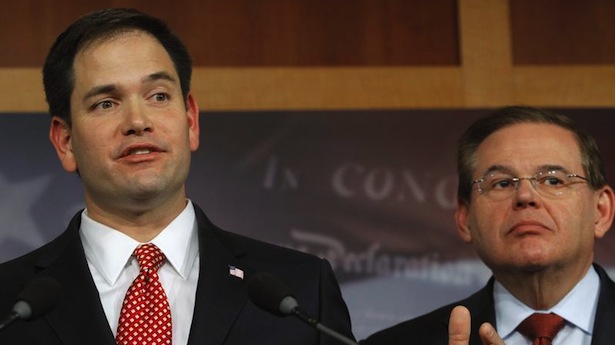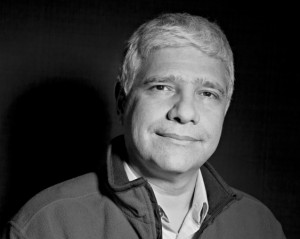
More Cuba hypocrisy in the U.S. senate
What is good for the goose is good for the gander. This very American expression came to mind while I watched last month’s confirmation hearing for Noah Mamet, who was nominated by President Obama to be the U.S. ambassador to Argentina. The chairman of the committee, Senator Robert Menendez (D-NJ), joined forces with his Republican colleague from Florida, Marco Rubio, to attack Mamet. Both senators expressed astonishment that Mamet, if confirmed, would play a central role in shaping U.S. policy toward a country he had never before visited.
But what if we hold the senators to their own standards? Menendez and Rubio have dedicated much of their political lives to one foreign policy issue: Cuba. Not a week passes without Rubio and Menendez demanding an apology from whoever favors even the slightest relaxation in the U.S. embargo against Cuba. Yet neither Menendez nor Rubio has ever set foot on the island (other than Rubio’s visit to the U.S. naval base and notorious detention center at Guantanamo Bay). They are just like most of the pro-embargo “experts” who have not been to Cuba over the last 10, 20, 30, or even 50 years.

Frank Argote-Freyre, who had been Menendez’s press secretary when he served in the House of Representatives and is now a professor at Kean University, told me how a trip to Cuba in 1999 changed his own support of the embargo. “For a time I believed that the U.S. embargo of Cuba was an effective economic strategy to encourage a more democratic system on the island and greater freedom of speech,” he told me. “My position on this subject changed in 1999 when I visited the island and saw that the embargo was having no impact on the Cuban government whatsoever. It seemed to me that the embargo — to the extent it was effective at all — was hurting individuals who were already struggling economically, by creating shortages of some items. It was hurting Cubans with lower and middle incomes. My visit put a human face on those being punished by the embargo.”
It is legitimate to question whether the U.S. system gives too much discretion to the president in nominating ambassadors. Many critics have argued that appointing campaign fundraisers like Mamet to ambassador posts, an increasingly common occurrence, amounts to political patronage. But that is another matter. Menendez and Rubio were using Mamet’s nomination as a pretext to attack the Obama administration’s approach to Latin America.
Mamet is not a career diplomat. But he responded to the senators’ questions with a diplomatic tone. When asked about Argentina’s friendly relations with Cuba, Venezuela, and Ecuador, Mamet recognized Washington’s differing views. But he also acknowledged that the central focus of his job would be handling the United States’ bilateral relations with Argentina, Latin America’s third-largest economy.
In marked contrast to Mamet’s measured responses, Menendez and Rubio pontificated — without any evidence — about how Argentine president Cristina Fernandez de Kirchner takes instructions from Fidel Castro.
As anybody knowledgeable about Latin America’s region-wide rejection of the U.S. stance on Cuba might note, Mamet’s answers showed sensitivity toward Argentina’s own nationalist history and deeply rooted resistance to the U.S. role in the region. Here are some highlights. In 1945, General Juan Domingo Perón ran for president of Argentina under the slogan “Perón versus Braden” — Spruille Braden being the U.S. ambassador to Argentina at the time. Most of the electorate rallied around the nationalist flag against opposition forces, considered puppets of the United States. Later, a 1961 meeting between Argentine president Arturo Frondizi and the Argentine-born Ernesto “Che” Guevara — the famed revolutionary [who participated in the Cuban revolution] — was used by Argentina’s armed forces as a pretext to overthrow Frondizi and impose a military dictatorship supported by the United States.
No sensible U.S. strategist would begin his tenure as ambassador by evoking these episodes, and Mamet rightly sidestepped anything that might reignite animosity. In their anti-Cuba and anti-Obama vendettas, in contrast, Menendez and Rubio have already caused unnecessary tensions in U.S.-Argentine relations — provoking Argentina’s Foreign Relations Minister, Hector Timerman, to reject the senators’ declarations about Argentina’s “immature” democracy and call on them to respect his country.
If they’re not willing to go to Cuba, Rubio and Menendez should at least pay more attention to reports from their constituents who travel to the island. They would likely find out that the embargo is harming, rather than promoting, human rights in Cuba. As Frank Argote-Freyre said: “More than 50 years of the embargo shows it is a policy failure, and its continuation serves no purpose. Rather, the embargo has been used by the revolutionary government to hide its failures over time. It has also been used as a justification for restricting democratic freedoms by fostering this sense that the Cuban nation is under siege and threatened by its powerful neighbor to the north.”
Majorities in Florida and New Jersey, the senators’ own states, agree. According to a recent poll by the Adrienne Arsht Latin America Center of the Atlantic Council, 56 percent of Americans — including 63 percent of Floridians, 57 percent of New Jerseyans, 60 percent of Democrats, and 52 percent of Republicans — support changing U.S. policy toward Cuba. All these majorities favor removing all restrictions on travel to Cuba by U.S citizens and allowing more U.S. companies to do business in the country.
Only in a culture of double standards could Menendez and Rubio question Mamet’s qualifications to serve as U.S. ambassador to Argentina based on the fact that he has never been there — without questioning their own qualifications to hold forth on U.S. policy toward Cuba. Since they have never themselves been to Cuba, they should be more modest in their claim to know about it.
What’s good for the ambassadorial nominee is good for the senators.
(From Foreign Policy in Focus)

